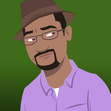Defining Genres
I've been thinking about what defines a genre. Below are my thoughts and observations over the years, not as a writer, but as a reader. I read a lot of different categories, but I won't cover everything.
Since these are based off my experiences, expect nothing to be 100% accurate. I might not even be right on anything and I'm also not going to cover all the sub-genres.
1. CHICK-LIT
Even though I'm straight, single man, I love chick-lit! The reason is that all chick-lit is a coming-of-age story, and I love coming-of-age stories. So much so that I wrote my own.
The protagonists are all women in their mid to late 20s. They deal with growing up, trying to live on their own, getting a job, having a love life, and making friendships. At one point, they lose all that and must struggle to succeed.
Now, there is a love interest, but that's not all there is. In fact, the love interest isn't as prominent as you might think. Since most books deal with poor 20-somethings, the man is usually rich and dashing, but not arrogant and flaunting. If the woman is rich, then the man doesn't make enough money. Either way, the man is humble.
Except for my non-existant love life and the fact that I like girls, I can actually relate to these books because of the things they deal with. I may be a guy, but I deal with them too.
2. FANTASY
People always ask what fantasy is. Some people think that having swords, magic, wizards, and dragons make it fantasy. My definition of fantasy is that it looks at where we've been. I mean "us" as the human collective.
Fantasy doesn't ask the big questions nor does it try to figure out where mankind is going. It's always looking backwards. Fantasy tries to figure out where we went wrong, how things were, what would have happened if X turned out differently.
3. HISTORICAL FICTION
This one's actually simple. It's fiction based in the past. I believe there are two kinds. There's the kind that's true (see Steven Pressfield) and there's the kind that's more a what-if but still has a lot of facts in it (see Harry Turtledove). While both kinds tend to adjust facts as they see fit, I believe the lessons learned from them are far more staying because they're enjoyable. I read non-fiction history books from time to time and they get pretty boring. It's like school.
4. HORROR
The easiest thing would be to say is that horror has something scary, whether it be an actual monster or psychological. While that's true, I find that horrors are more mysteries than anything else. The hero has find out what and why something is wrong and figure out how to beat it. A good horror will make your skin crawl while you're reading it and more than any other story, you'll root hard for the hero winning at the end.
5. SCI-FI
I've always thought that sci-fi and fantasy are two sides of the same coin. There is a reason why there's a lot of overlapping and why in a bookstore, you'll often seen fantasy/sci-fi.
Now, if fantasy talks about the past, sci-fi talks about the future and where we as a people can go. A lot of Star Trek is about that. How will we deal with new situations? What's out there? You don't get those kinds of questions from Star Wars, which is one reason why Star Wars isn't fantasy.
Sci-fi's not about the technology, aliens, space, or scientific babble. Yes, some of books and movies do have that, but some don't. Books like Dune or Starship Troopers are considered sci-fi, but aren't heavily focused on it.
6. WESTERNS
In movies, westerns appear to be making a resurgence. Too bad, the same can't be said for books. Anyways, I like to read a good western from time to time. I would consider Stephen King's Dark Tower series part-western/part-fantasy. Unlike all the above genres, westerns are pigeonholed into a certain setting and time period. That severely limits them. But what makes a western?
I believe a western is the best genre for the anti-hero. The more gritty and realistic movies and books seem to portray this. They're also more of a man's man. In today's soft and political correctness world, I can see why westerns don't sell as well.
Those are the six main genres I read. There are sub-genres I read and other genres that I don't read as much. I love mysteries and romance in my books, but I don't like reading mysteries or romance. I'll occasionally pick up steampunk even if I'm not quite sure what it is.
Do you agree with me? If not, what am I missing? What genres do you read and how would you define them?
Marc Johnson



